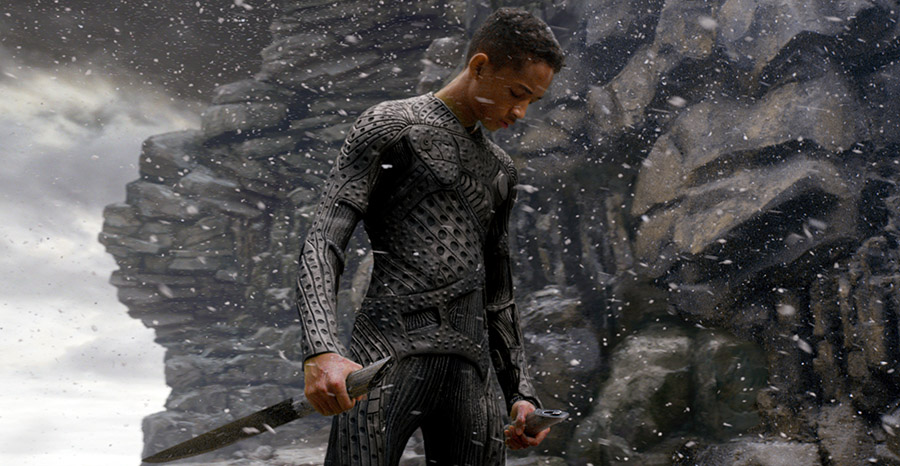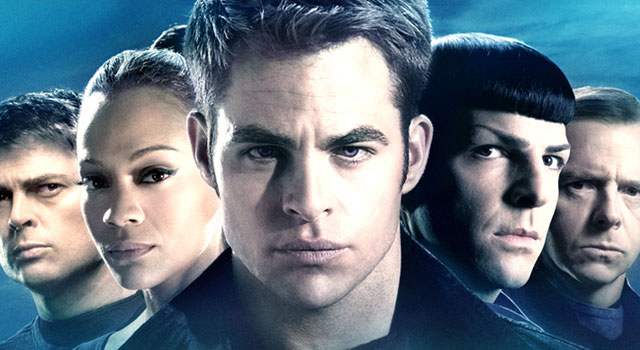After Earth (2013)
Rated PG-13

Sony – Columbia Pictures
Yes, it’s a project of hubris (Will Smith turned down Django Unchained for this?), and yes, director M. Night Shyamalan (The Sixth Sense, The Happening, The Last Airbender) is in a rut. Even so, After Earth isn’t all that bad. I wouldn’t measure it against the current crop of summer movies, but it’s one of those watchable flicks you stumble into while flipping through one of your hundreds of cable TV channels.
 In the distant future, man has long ago departed earth for more hospitable climes. Nova Prime is our new home and Smith’s Cypher Raige is the leader of our peacekeeping Rangers. Rangers take on the S’krell, alien beings bent on our destruction. The S’krells hope to vanquish us with their vicious Ursa creatures which, though blind, can hunt by sensing fear. Cypher discovers how to defeat the Ursas by “ghosting,” which is a method of controlling one’s fears, thus becoming invisible to the creatures. He is legend. Now if only he could connect with his distant son Kitai (Jaden Smith), who strives to prove himself to himself and his doubting father.
In the distant future, man has long ago departed earth for more hospitable climes. Nova Prime is our new home and Smith’s Cypher Raige is the leader of our peacekeeping Rangers. Rangers take on the S’krell, alien beings bent on our destruction. The S’krells hope to vanquish us with their vicious Ursa creatures which, though blind, can hunt by sensing fear. Cypher discovers how to defeat the Ursas by “ghosting,” which is a method of controlling one’s fears, thus becoming invisible to the creatures. He is legend. Now if only he could connect with his distant son Kitai (Jaden Smith), who strives to prove himself to himself and his doubting father.
Father and son each carry the burden of guilt over the loss of daughter/sister Senshi, who died defending young Kitai from an Ursa. So with the pieces in place, father and son are goaded by wife/mom Faia into using a Ranger training exercise as a bonding getaway. Things get bad when their spacecraft encounters an asteroid shower, worse when it crashes on quarantined earth, worse still when the captured Ursa brought along for training purposes escapes the wreaked vessel.
With the ship’s distress beacon flung miles from the scattered ship, and Cypher critically injured, it’s up to Kitai to traverse the hostile environment, with the Ursa on his tail, to retrieve the beacon. Can the son overcome his fears? Prove himself to dad? Avenge his sister?
Will Smith’s role in this is limited. This is a showpiece for his son. Jaden is serviceable, though he lacks his dad’s effortless charm and needs a few more laps around the acting track. To be fair, he’s younger than his dad was when Will got his start, and Jaden carries the burdens as well as benefits of nepotism. But he doesn’t embarrass himself and involved me in his plight. It’s a decent time-waster, but you can waste that time once it comes to TV.

| Marvin Brown’s Movie Review Archive





 “The finale, shot-for-shot, matched the finale of (1982’s
“The finale, shot-for-shot, matched the finale of (1982’s 
 A theme of connectedness and reincarnation binds the stories—lovers who face tragedy in one life, might find happiness together in another; sins and hopes of the past ripple through time and sometimes switch places, depending on the era.
A theme of connectedness and reincarnation binds the stories—lovers who face tragedy in one life, might find happiness together in another; sins and hopes of the past ripple through time and sometimes switch places, depending on the era.



